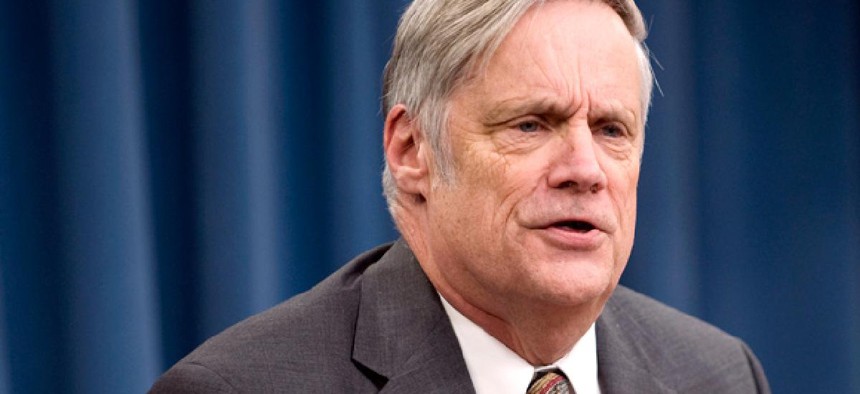
Defense Comptroller Robert Hale Defense Department
Lawmakers consider TRICARE request
Pentagon explains why it wants to move health care money.
Lawmakers are still considering the Pentagon’s request to move funds from its health care program to cover costs associated with overseas military operations, according to a spokeswoman for Rep. Joe Wilson, R-S.C.
The department has asked Congress to reprogram $708 million of fiscal 2012 TRICARE funds to help pay for “unexpected increases” in wartime funding. Some of those unplanned expenses, according to a July 30 letter to House lawmakers, include transportation costs resulting from the closure of Pakistan ground lines of communication and increased Navy operating costs because of an extra carrier in the Central Command region. The letter, from Defense Comptroller Robert Hale, also blamed higher fuel costs for increasing training and operating expenses departmentwide.
A bipartisan group of representatives, led by Wilson, chairman of the Armed Services Personnel Subcommittee, questioned the Pentagon’s move, wondering whether the reprogramming request stemmed in part from congressional rejection of the Obama administration’s recommendation to increase TRICARE fees. Hale and Dr. Jonathan Woodson, assistant Defense secretary for health affairs and director of TRICARE Management Activity, briefed members of the House Armed Services Committee last week on the request. Lawmakers must approve any requests from agencies to transfer appropriated funds to other accounts within the budget.
The July 30 letter from Hale to members of the Armed Services Committee said the $708 million in available TRICARE funds “does not result from any underfunding of the health needs of our military members, retirees and dependents.” Defense wants to shift some of the money -- $6 million -- into the health program’s research arm to fund “emerging requirements,” including advanced development of medical products to enhance wound cleansing and care, better warming and cooling technologies for injured service members, and an information technology interface for electronic data captured from aeromedical evacuations.
Defense noted the $708 million represents slightly more than 2 percent of the total health care program’s fiscal 2012 funding, and the department has to estimate its budget needs two years ahead of time because of the appropriations process. “Given the uncertainty about medical inflation and health care use, and the impact of continual benefit changes and efficiency initiatives, we believe that an estimate that is 98 percent correct is reasonable,” the letter stated. “While we overestimated expenses by about 2 percent last year, in other years we have had to move money into the TRICARE program and reduce other spending.” Congress appropriated about $53 billion in fiscal 2012 to fund health care for service members, military retirees and their families.
The department also defended its efforts in suicide prevention and caring for service members with traumatic brain injury and post-traumatic stress disorder. The letter said the Pentagon is developing treatments, examining new technologies and hiring more health professionals to deal with those illnesses and provide better access to treatment. “We do not believe that adding more fiscal 2012 funds for these ailments would be effective or efficient,” the letter stated.
The Pentagon’s request to reprogram fiscal 2012 funds comes at a time when the Obama administration and lawmakers on both sides of the political aisle are debating increases to TRICARE enrollment fees and other health care-related costs. The administration in its fiscal 2013 budget proposed raising TRICARE fees for military retirees and their dependents during the next five years, with those in the upper-income brackets seeing the biggest hikes. The cost of providing health care to the military community has more than doubled in the past 12 years; enrollee fees have stayed relatively flat since 1995. So far, both chambers have rejected the administration’s specific proposals to hike fees.







